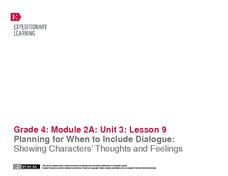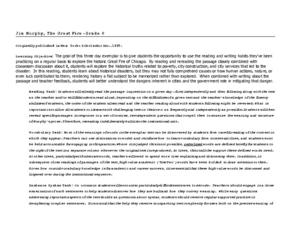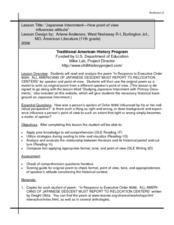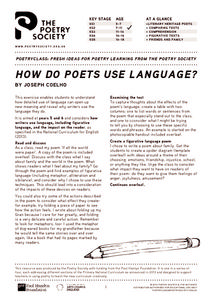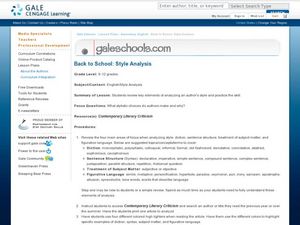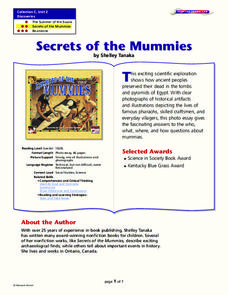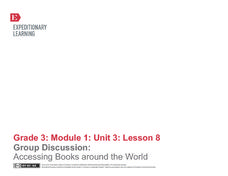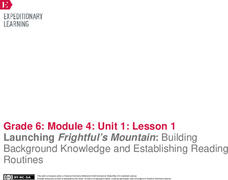K12 Reader
Atmospheric Layers
In this two-part reading comprehension worksheet, kids read a passage about the atmospheric layers surrounding the earth and then respond to a series of comprehension questions based on the passage.
EngageNY
Planning for When to Include Dialogue: Showing Characters’ Thoughts and Feelings
Young writers examine dialogue conventions, including indentation, quotation marks, and expressing thoughts and feelings through a fictional text. By noticing where and when authors use dialogue, they decide how to incorporate dialogue...
Curated OER
Jim Murphy, The Great Fire - Grade 6
The Great Fire by Jim Murphy provides the text for a study of the Chicago fire of 1871. The plan is designed as a close reading activity so that all learners have the same background information require for writing. Richly detailed, the...
Curated OER
Frederick Douglass, Narrative of the Life of Frederick Douglass an American Slave, Written by Himself
Foster reader confidence when encountering complex text and reinforce the skills readers have acquired to build and extend their understanding of text. The plan uses a section of Douglass’ narrative as an exemplar text. Directions for...
EngageNY
Launching Readers Theater Groups: Identifying Passages from Esperanza Rising for Readers Theater that Connect to the UDHR
Teach young readers how to compare two texts and select passages that exemplify a specific theme with Lesson 6 from Unit 3. Begin by modeling how an expert reader selects examples from a text, performing a think aloud on how Article 2 of...
Curated OER
Japanese Internment--How Point of View Influences Attitude
How does background and experience influence one's point of view? Dwight Okita's famous poem about the Japanese internment is the text used to explore this essential question. Class members study primary documents to gain the necessary...
Curated OER
Seeing the Image in Imagery: A Lesson Plan Using Film
In our increasingly visual society, it is often difficult for some readers to create a mental picture of a picture created only with words. An image-rich text like F. Scott Fitzgerald's The Great Gatsby can therefore, present a real...
Curated OER
Whitewater Canal State Historic Site
If you happen to live in Indiana, or a neighboring state, and are planning a field trip to the Whitewater Canal State Historic Site, then this lesson plan will suit your needs quite well. In it, suggestions for activities before, during,...
Curated OER
Amelia Earhart
Your class can learn about Amelia Earhart and practice important comprehension skills here. Learners answer questions about cause and effect, compare texts, and discuss similes and metaphors after reading Amelia Earhart: Free in the...
Curated OER
Sadako and the Thousand Paper Cranes
Have your class explore the effects of war by reading Eleanor Coerr's story, "Sadako and the Thousand Paper Cranes." This is a story about a sixth grader who lives in Hiroshima when the atomic bomb is dropped. Learners answer questions,...
EngageNY
Close Reading of That Book Woman: How Did People Access Books in Rural Areas of the United States?
For this ninth lesson plan in a larger beginning-of-the-year unit, close reading skills are used independently to find the gist of the story That Book Woman. Rereading for important details is the targeted skill to unlock a deeper...
Poetry Society
How do Poets Use Language?
Why do writers choose the language they do? Here's a resource that has the poet himself answer that very question. Joseph Coelho explains why he chose the words and images he used in his poem, "If All the World Were Paper."
Curated OER
Back to School: Style Analysis
Jump back into expository writing and analysis at the start of a new school year! Start with a review of an authors' stylistic choices in diction, syntax, treatment of subject matter, and figurative language. Writers choose a text to...
Curated OER
The Treaty of Versailles and the Effects of WWI
Help your historians comprehend perspectives of the Versailles Treaty by paralleling the event to a peace meeting in the classroom, which 2 participants aren't invited to. Consider making it more relatable: instead of the class going to...
Curated OER
Skin and Sports
The topic is protecting our own protective covering: the skin. In particular, the information deals with sweating as a means of temperature regulation and the need to wear clothing appropriate for allowing the process to occur. Learners...
Curated OER
Dracula: Directed Reading Thinking Activity (DRTA)
“There are often dangers from snow and wolves and night.” Bram Stoker’s “Dracula’s Guest,” which may or may not have been the first chapter of the original Dracula manuscript, is the focus of a Directed Reading Thinking Activity (DRTA).
Curated OER
Parrot in the Oven: Think Aloud
A think aloud activity is a great way for readers to develop critical thinking skills. This resource models for readers how to use this strategy to think critically about a passage from Victor Martinez's Parrot in the Oven.
PBS
Explicit and Implicit Language – Interpreting the Meaning of the Fourteenth Amendment
How do Supreme Court justices interpret amendments to the Constitution? The resource helps answer that question by discussing how people use explicit and implicit language to interpret the meaning of the Fourteenth Amendment. Learners...
Curated OER
Discovering Saturn, The Real "Lord of the Rings"
Reading, writing, and rings! A lesson from NASA combines space science with authentic reading and writing tasks. Included in this lesson are pre-reading activities, four mini informational booklets on Saturn, a structured note-taking...
Curated OER
Secrets of the Mummies
How did the ancient people of Egypt preserve their dead so well that their bodies are still recognizable today? Learn the painstakingly complex process they used for preservation. Young scholars read and summarize a narrative detailing...
Curated OER
Navajo Code Talkers
An engaging lesson focuses on the contributions of the Navajo people during World War II. Learners read the book Navajo Code Talkers by Andrew Santella, answer a series of comprehension questions about the text, and write a letter as a...
EngageNY
Group Discussion: Accessing Books Around the World
Continue work with an informational text by following the procedures detailed here. The plan, part of a series, focuses on My Librarian is a Camel. Class members complete text-dependent questions and then prepare for and participate in a...
Curated OER
Post-Colonial Writers Unit
How do cultural and historical background impact thought? To explore this essential question, class members view of portion of the film, The Passage to India, read an excerpt from The Magician’s Nephew, and Nissim Ezekiel’s poem, "In...
EngageNY
Launching Frightful’s Mountain: Building Background Knowledge and Establishing Reading Routines
Welcome to Frightful's Mountain. The teacher introduces scholars to the text Frightful’s Mountain by reading the first chapter aloud. Learners then talk with a partner about the text. The instructor models answering focus questions as...



